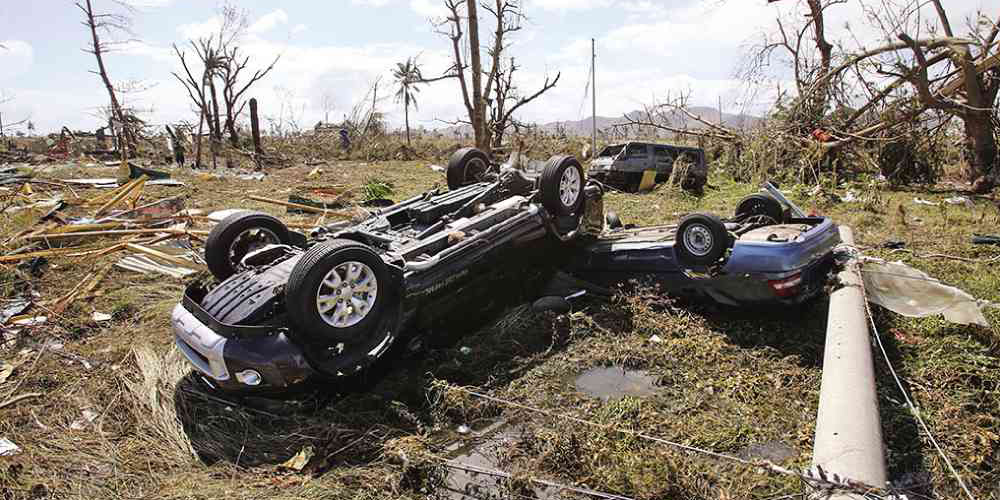
CARS lie upside down on a street in Tacloban City while the horizon paints an image of utter destruction. These are some of the scenes the Bastian family escaped from. LITO TECSON/CEBU DAILY NEWS
BAGUIO CITY—Family members of a Benguet-born rural bank consultant have survived Supertyphoon “Yolanda” in Tacloban City and have started to make their way back to their province, leaving behind the wreckage and despair of their adopted home as well as lessons on how “a broken government” could be more disastrous.
In a telephone interview on Thursday, Christopher Bastian and his wife, Melinda, said they experienced almost every bad story reported in the media about the disaster and the government’s slow response.
But the couple said they owed their lives to common sense and a considerable amount of unseen circumstances.
As Yolanda drew nearer to the city, they decided to stay at the house they were renting after concluding that the city government’s instruction for people to evacuate to the Tacloban City Astrodome was foolhardy.
“We were not sure why the authorities wanted us to move to an evacuation center standing on reclaimed area near the sea, so we stayed [at home],” said Bastian, 49, a Kankanaey-Ibaloi with roots in La Trinidad Valley, Benguet province.
They were correct. Storm surges lashed through the inland settlements between 6:30 and 8 a.m. on Friday, and damaged portions of the astrodome.
“Our [V&G Subdivision] is about a kilometer away from the sea. But we were lucky. The storm surges were half a kilometer away, so we were spared,” said Bastian.
“Had Yolanda stayed above the city for another 30 minutes, the storm surges would have reached us,” Bastian said.
Floods, however, entered the house and the winds shattered the windows and ripped portions of the ceiling. “So we braved the floods and walked out into the streets at 9 a.m., only to discover we were in a ghost town,” Bastian said.
He said they could not find any village official “when there should have been community teams manning disaster risk reduction and management operations as required by law.”
“We were all exposed to the [disaster management] protocol and the officials underwent so many training [programs]. I am aware that [Interior Secretary Mar] Roxas and [Defense Secretary Voltaire] Gazmin led preparatory meetings here before the storm. But when the disaster struck, no one was around to help. What happened to the training?” he said.
Bastian’s son, Christopher Jr., 11, and daughter, Maria Kristina, 9, kept shouting for help as the family made its way through the flood to reach a locked health office, which was 100 meters away from their home. They rode out that nightmare until Sunday with 10 other families.
Bastian said he hiked 7 kilometers to the downtown area on Saturday to look for food. A store opened and sold him 2 kilograms of rice for P100.
“We were always told relief goods were coming but nothing came. Soon people were looting [three shopping malls], although I have reservations about that word. People were simply starved and were concerned about the next meal,” he said.
His family decided to leave the city on Sunday. He said they walked 10 kilometers to reach the city airport.
They queued for four days— even during thunderstorms, which drenched their children— “because we could not lose our place in the line,” he said.
Soldiers had arrived to secure critical facilities like the airport “but they disappeared at night and were not around to provide crowd control when it was needed,” he said.
He said the people were also furious when airport administrators allegedly gave preferential treatment to businessmen flying out of Tacloban.
The family watched many people beg for “a gulp of water” that soldiers were able to spare in the absence of potable water. “They did not even set up food lines for us,” Bastian said.
Luck favored the family once more when a commercial plane activated mercy flights on Wednesday. That enabled them to fly to Cebu province, where the family finally had a decent meal, he said.
Bastian said they were now waiting for a chance to travel home to Baguio City, where the couple lived and studied. They migrated to Tacloban where Melinda, a lawyer, set up a law office.
“There are no more courthouses, so life as we know it has ended. We can’t live there anymore,” Bastian said.
NOV. 8
The Bastian family stays home but is forced to move out due to floods and strong winds. They find that Tacloban City has turned into a “ghost town.” No official, village or national level, is around. They break into a locked government clinic and seek shelter there.
NOV. 9 and 10
The Bastian family stays at the clinic for three days, living on food that Christopher Bastian is able to buy outside, including 2 kilograms of rice that cost P100. The city food supply runs out, forcing the family to open canned goods. The family decides it’s time to leave Tacloban and heads for the airport on foot.
NOV. 11, 12 and 13
After walking for 10 kilometers, the Bastian family reaches the Tacloban airport. Without any food, they subsist on peanuts and water. Rain from Tropical Depression “Zoraida” drenches them as they queue for a plane ride. They get one on a private commercial jet that is on a mercy mission and reach Cebu City, where they have their first decent meal.